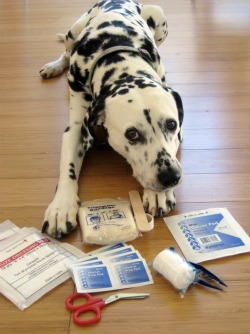
Accidents can—and do—happen, so being prepared is crucial for keeping your canine companion safe. You can be a responsible guardian by always having a first aid kit handy for your dog.
With items you can find at your local drugstore, you’ll be ready to provide a swift and efficient response to accidents or injuries. (Please note: Many items found in a first aid kit should only be administered under a veterinarian’s guidance, but having them readily available allows for quicker treatment and can minimize any pain or discomfort your animal may be experiencing.)
What to Include in a First Aid Kit for Your Dog
- A bedsheet, a towel, or a throw blanket (which can be used as a makeshift stretcher for larger dogs or as a barrier to protect humans from being bitten)
- A compact emergency thermal blanket
- Epsom salt
- Grooming clippers
- A leash (which can be used as a temporary muzzle in an emergency)
- Mild soap
- Nail clippers
- An oral syringe
- A pediatric digital rectal thermometer plus a water-based lubricant (The normal temperature range for dogs is 101 to 102.5 degrees.)
- Rubber gloves
- Saline eye wash
- Tweezers
- Wound-care items, including hand sanitizer, antiseptic solution such as Betadine, elastic bandages, stretchable gauze, gauze pads, nonstick bandages, nonscented sanitary pads (for heavily bleeding wounds), first aid adhesive tape, blunt scissors, and styptic powder (to stop light wounds from bleeding)
Note that it’s important to consult with a veterinarian before administering any treatment or medication, especially the following:
- Diphenhydramine antihistamine or Benadryl (to counter allergic reactions)
- Hydrogen peroxide 3% U.S.P. (to induce vomiting)
- ToxiBan or other vet-approved activated charcoal (for use in certain poisoning emergencies)
But you’ll still want to include them in your canine first aid kit.
Other Helpful Tips
Remember: In the event of an emergency, time is of the essence. Program useful contacts into your phone, including the phone numbers and addresses of your veterinarian and a 24-hour emergency animal hospital.
Awareness is crucial when it comes to trying to prevent emergencies. Many common household items—including human medications, household cleaners, plants, and foods—can be poisonous to companion animals. Click here for a list of items that you should keep away from animals. Make sure to have the ASPCA Poison Control Center 24-hour hotline number (1-888-426-4435) in your address book.
See additional information about creating a first aid kit for your canine companion here. You can learn more about dog safety by checking out PETA’s animal companion safety tips:
Text VEG to 73822 to get the latest vegan lifestyle tips, recipes, and urgent action alerts texted right to your phone.
Terms for automated texts/calls from PETA: https://peta.vg/txt. Text STOP to end, HELP for more info. Msg/data rates may apply. U.S. only.







